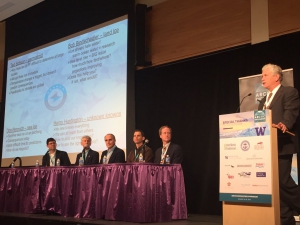SEARCH Promotes Actionable Science at Arctic Encounter Symposium

A SEARCH science panel was invited to present at the 3rd Annual Arctic Encounter Symposium this January in Seattle, WA. Joining an audience comprised largely of legal scholars, industry leaders, government officials, and native Alaskan stakeholders, SEARCH served as an important envoy for scientific knowledge at what has now become the largest annual Arctic policy event in the United States.
“We recognize that, as scientists, we have a responsibility to our colleagues and the public to take on the burden of clear communication,” said Dr. Brendan Kelly, executive director of the Study of Environmental Arctic Change (SEARCH). “If we make our work accessible, we shall enhance scientific collaboration, we’ll better serve society, and our science will benefit from the insights of those whose specialties are local knowledge, resource management and policymaking.”
Emphasizing SEARCH’s belief in the value of interdisciplinary and actionable science capable of enhancing the policy and planning decisions of diverse Arctic stakeholders, SEARCH panelists invited their fellow audience members to approach them with questions, issues in need of greater scientific attention, and feedback on their ability to share scientific information in a clear and compelling manner.
Additionally, SEARCH panelists conveyed many key insights into Arctic change science to better inform the community’s collective efforts to contend with both the immediate and future challenges facing the Arctic and its people.
Dr. Ted Schuur of Northern Arizona University illustrated the threat that melting Arctic permafrost presents to Arctic infrastructure development and our global efforts to control the average temperature of the Earth’s atmosphere.
Dr. Bob Bindschadler, NASA Emeritus Scientist, emphasized the unprecedented rate of ice loss from the world’s glaciers and what it implies for future sea-level rise, human displacement, and geopolitical destabilization.
Dr. Don Perovich, a Research Geophysicist with the Cold Regions Research and Engineering Laboratory, explained how scientific efforts to understand, monitor, and predict the extent of sea ice in the Arctic are motivated by many national and industrial efforts to exploit new and emerging resources and capabilities in the region.
Dr. Henry Huntington concluded the panel presentations by stressing the critical need for different types of knowledge holders to ask questions of one another and to connect across long-standing barriers of culture, academic discipline and/or business sector.
Please contact Brit Myers (brit [at] arcus.org) for more information.
